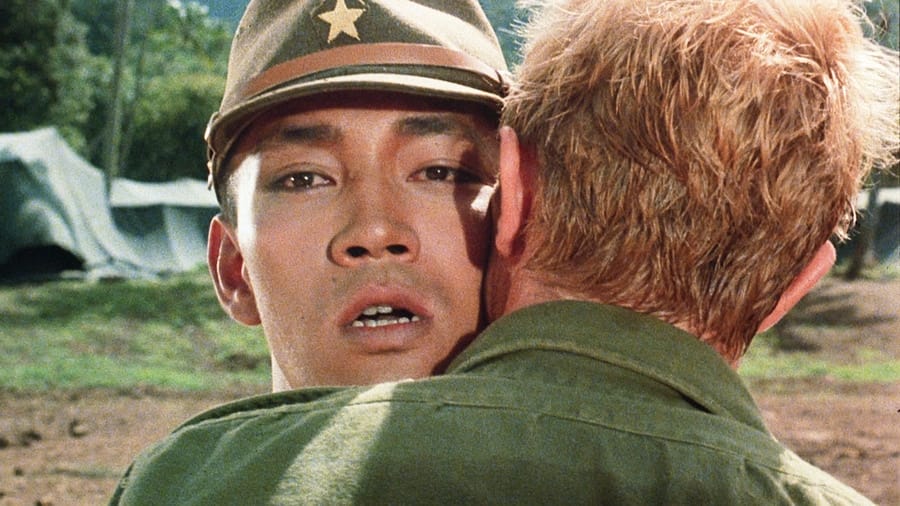Although Merry Christmas, Mr. Lawrence was released in 1983 and took place in a Japanese POW camp during World War II, it has not lost any relevance. This hidden gem can also be intriguing for music connoisseurs, thanks to the roles played by important figures in music history: David Bowie and Ryuichi Sakamoto.
To explain the origin of the movie's title, we should not start in chronological order. Sergeant Gengo Hara, who shortly before had sentenced to death one of his favorite prisoners, Mr. Lawrence, because of a crime he didn't commit, suddenly gets drunk on sake and becomes kinder. He pretends to be Santa Claus, giving life to a British prisoner on a fictitious Christmas. We all know how often people do stupid things while intoxicated, but it turns out even evil can find a drop of humanity after half a liter of sake. However, is this sergeant indeed that evil?
At the end of the film, four years later, we see Mr. Lawrence visiting his former captor, who has been sentenced to death, and the latter tells him: "I'm ready to die, but I don't understand. My crimes were not different from any other soldiers."
Hearing such words, one is immediately reminded of Eichmann in Jerusalem: A Report on the Banality of Evil, Hannah Arendt's book describing the trial of former Gestapo Obersturmbannführer Adolf Eichmann. At the trial, she did not see a fraction of remorse from Eichmann for his criminal acts, as he said he was only doing his job and duty, just as Gengo Hara says. In her work, Arendt tries to separate responsibility from intent with a cold mind. Mr. Lawrence, on the other hand, answers the sergeant's question in the film in a more melancholy way, implying that there are no right sides here. They all have become servants of men who are convinced they are right. Is it because he owes his life to Gengo Hara, because he developed Stockholm syndrome during his captivity, or simply because Gengo Hara is indeed not all that bad that Mr. Lawrence feels this way? These are all questions with no clear answer.

The role of Sergeant Gengo Hara is played by Takeshi Kitano, the famous Japanese director of extremely violent, touching, and quite humorous films. Still, he is not the main character here, nor is even Mr. Lawrence. The role of the reckless Major of the British Army, Jack Sellers, convincingly played by David Bowie, is the true protagonist. His character has an impressive fortitude of spirit, which is repeatedly tried to the breaking point in the camp. That said, on the eve of his delayed execution, he also shares with Lawrence that his conscience is not at all clear and that he betrayed his little brother as a child.
After failing to protect his brother at boarding school from peer bullying because he didn't want to ruin his fine reputation by associating with a hunchbacked kid, the younger Sellers, gifted with a marvelous angelic voice, will never sing again. On the eve of his execution, Bowie's character remembers how his brother sang and laments that he will probably never be able to see him again before his death and ask for forgiveness.
However, the man who once betrayed his beloved little brother finds the strength to stand up for his ill-favored comrade in misfortune. He covers the imprisoned Air Force Colonel Hicksley with his chest in front of the camp captain, Yonoi, who had already drawn his sword. Then he kisses the captain on both cheeks, thereby condemning himself to certain death. After that, he is buried alive; he turns to his brother in his thoughts and receives his forgiveness. Could Jack Sellers, however, forgive himself for his childhood mistake despite the many good things he did afterward? One never knows.
Composer Ryuichi Sakamoto plays Captain Yonoi. The reserved Captain Yonoi practices traditional samurai swordwork and harakiri in his camp. He cannot understand his captive Englishmen who decide to surrender, as he says that if a Japanese soldier were captured, he would rather kill himself immediately out of shame. Captain Yonoi can be quite cruel and spits on the rules of the Geneva Convention. For example, he forces the severely wounded prisoners to march in formation, ending in the death of one of them because his body cannot withstand such a load. At the same time, when Jack Sellers kisses him on both cheeks, he completely loses emotional control so that his subordinates think that a demon possesses him. Before Jack Sellers dies in the sand, Yonoi cuts off a lock of the dying Englishman's hair to take it to the family temple in his home village. He also has quite a contradictory personality, brilliantly played by the composer, showing us not the banality but the multifaceted nature of evil.
Even more brilliantly, the composer manages to convey the contradictory nature of what we see in this movie in the soundtrack he created. Despite all the evil, cruelty, and pain we see on the screen, the music accompanying the film is quite chamber-like and touching, conveying a sense of peace and kindness. If one hears it out of context, no listener would guess that it's a soundtrack to a war movie. Probably that's why it reached the Top 20 singles chart in the UK, won a BAFTA award, and became one of the British, American, and Japanese Christmas classics. If you haven't heard this soundtrack, I strongly recommend including it in this year's holiday playlist because of its beauty and as a sorrowful reminder that Ryuichi Sakamoto passed away in 2023. And despite all the spoilers, watch the movie—it's unlikely to leave anyone indifferent.









Comments